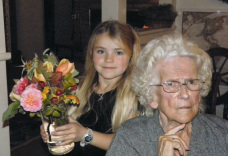At the Speed of Life  Her sister wove a garland to crown the princess and evening light gilded her hair. There’s something special about being eight. It doesn’t hurt to be the youngest, thoughtfully gifted by all your older siblings. No one minds being a beneficent sovereign, even for a day. And, as my dad used to tell me, “You’ll never be eight again.” I remember my excitement at dipping into the double digits—the day separating nine-year-olds from ten-year-olds is a monumental wall. But quietly, amid smears of frosting and piles of wrapping paper and happy singing, I crossed an invisible line. I could never be nine again . . . then ten . . . then forty. My eight-year-old can’t feel the acceleration yet. One of my earliest memories revolves around my mother making me wait—for an everlasting five minutes. And every parent has heard some variation on the theme “Are we there yet?” called from the back seat of the car. We are born into a world locked in time, and every step is measured by its pendulum. We who are older catch a glimpse of our reflection and wonder how the person who looks back could be the twenty-one-year-old that we were just yesterday. The accumulation of years and experiences and sorrows and joys press us, unrelentingly, to a run. As it turns out, not much separates eight from eighty—or nine from ninety. From my vantage point, I’m looking at sixty, even seventy, and thinking it doesn’t look that old anymore . . .  To be honest, I’m chagrined by the pace. I want to lock moments into a safe place where I can hold onto them—to capture a capful of sea breeze from a beach vacation or a vial of snow from a mountain ride, to take a breath of foreign air in the claustrophobic room of routine or to feel the cold crispness of ice when circumstances are too hot to handle. Then again, there's a part of me that would like to instantly arrive at the weekend when Tuesday makes it seem forever away. But life just doesn’t work that way. My beloved Grandmother, as she lay dying, said to me, “It will be your turn before long.” It’s true. The end of my race really isn’t that far from it’s beginning. Stopping the clocks won’t hold time back; piles of souvenirs will only keep our kids busy when they disperse our earthly goods. We’re traveling at the speed of life. When Jesus stepped onto the scene of this world, we caught a glimpse of eternity fleshed out in a world of time. Young Jesus grew in stature over the course of time as any boy since our race began. He traversed the bridge to adulthood as every other young man must. He worked; He sweated; He learned—and it all took time. He experienced the press of time, at just twelve urgent to be about His Father’s business and in His short ministry of its brevity, “. . . night is coming when no one can work” (John 9:4). But He lived in time without being ruled by it.  His mother notified Him when the wedding feast ran short on wine. He replied, “What has this to do with Me? My hour has not yet come” (John 2:4). His brothers urged Him, “Leave here and go to Judea . . . For no one works in secret if he seeks to be known openly . . .show Yourself to the world .” Jesus answered, “My time has not yet come, but your time is always here” (John 7:3-6). When His friend, Lazarus, was deathly sick He did not race to the bedside to comfort or restore. “. . . when He heard that Lazarus was ill, He stayed two days longer in the place where He was” (John 11:6). Jesus heard the clock; He knew His time was short. But above the inexorable ticking of the passing seconds, Jesus heard the beating of His Father’s heart and was at once both peaceful and determined. Peaceful, because His times were in God’s hands; determined because nothing, not even the press of time, must deter Him from His Father’s purpose. The easiest, most natural thing was for Jesus to follow the prodding of His relatives, to get out in the public eye and to build His following. They were right: No one works secretly if they want to be known openly. Jesus didn’t acquiesce because He wasn’t driven by the clock, but by the will of God. The simplest thing would have been to keep Lazarus from dying. Jesus didn’t rush to the sick man’s side because He wasn’t tied to the moment, but to the glory of His Father.  Jesus transcended time—both its rush of urgency and its impatience in waiting—by living in the eternal. Many have marched to the beat of a different drum, the desires of their own hearts pounding in their ears, eyes glued to the clock. Jesus kept step with another world, and keeping step with the rhythmic beat of His Father’s heart was the only thing that really mattered. For Jesus, it wasn’t a question of getting more done; it was a matter of completing the work that the Father had given Him to do. His will was enveloped in the purpose of God. Even in His time of crisis, longing to escape the suffering of His appointed hour, Jesus clung to the Father’s good pleasure: “. . . not My will, but Yours, be done” (Luke 22:42). This connection to the eternal didn’t yield a laissez-faire attitude, a “come what may” sensibility in Jesus’ life. He was no fatalist; He was passionate and intense. More than once He worked through the day and prayed through the night. But He could also fall asleep during a wild storm at sea . . . His whole purpose was keeping step with God. We’re told that God makes everything beautiful in His time, and in the same breath that He has put eternity into our hearts (Ecclesiastes 3:11). It’s that conflict between time and eternity that often produces frustration in our ordinary daily lives. We’re eternal beings locked in a temporal world—and we can’t reconcile the two We struggle to find peace in the process. There’s a fathomless gap between our understanding and the mind of God. We “cannot find out what God has done from the beginning to the end” (Ecclesiastes 3:11) When we’re pressed on every side by urgencies, when we’re standing still and waiting for God to open a door, when we’re suffering and ready to be done—we must look past our time-line to the God of eternal purposes. I’ll confess, amid my own storm of small crises—like car trouble and septic problems—I’ve grown pressed and very tired. Add to that all the normal necessities of work and family and there just isn’t any wiggle-room; scarcely time to sit still. What I want is time, and it is most elusive. Pressure is a normal thing, used by God to conform us to the image of His Son. Tension arises when there are discrepancies between my will and God’s, between my timing and His. “I’m not asking for much, just a reprieve from relentless demands, a little more time,” I could reason. Have I disconnected from the eternal? “Wouldn’t this be a good time to open a door, Father?” Perhaps it would, but if it isn’t, can I be content with where He has placed me for now? Keeping step with God must master our longings, override our unspoken timelines. We’re moving at the speed of life—at God’s speed—and whether it seems slow or fast, it’s not our apparent productivity that counts, but whether we are walking with Him. After all, it won’t be long before it’s our turn to enter eternity. There’s no better time than now to synchronize our clocks with heaven. As a father shows compassion to his children, so the Lord shows compassion to those who fear Him. For He knows our frame; He remembers that we are dust. As for man, his days are like grass; he flourishes like a flower of the field; for the wind passes over it, and it is gone, and its place knows it no more. But the steadfast love of the Lord is from everlasting to everlasting on those who fear Him, and His righteousness to children's children, to those who keep His covenant and remember to do His commandments. Psalm 103:13–18 © November 2011 by Robert G. Robbins
5 Comments
Nick and Kristine
11/5/2011 06:00:31 pm
Fantastic.
Reply
Auntie S
11/7/2011 11:23:22 pm
Thanks once more, Rob--for timely reminders richly woven with Godly wisdom, and for the wonderful pix into a special day for a very special young lady! Love you so much!
Reply
Wonderful pictures of an 8 year old. God is also giving you His insights on the brevity of our life on earth, yet He tells us in Ithess.5:24 "Faithful is He that calleth you, who will also do it."
Reply
Leave a Reply. |
Archives
October 2017
|

 RSS Feed
RSS Feed